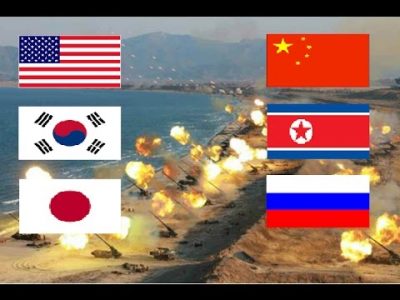Russia and China Versus the West on North Korea

VISIT MY NEW WEB SITE: stephenlendman.org (Home – Stephen Lendman). Contact at [email protected].
Their positions are world’s apart – evident in Monday’s Security Council meeting on North Korea.
Russia and China urge diplomacy to resolve a deepening crisis. They want tensions defused.
They oppose counterproductive tougher sanctions, threats and saber rattling, encouraging enhanced development of North Korea’s nuclear and ballistic missile programs.
Above all, they want war on the Korean peninsula avoided. They sensibly proposed a double-freeze.
In return for Washington, South Korea and Japan halting their provocative military exercises Pyongyang believes are rehearsals for war, Russia and China call for suspension of the DPRK’s nuclear and ballistic missile programs.
Russia’s UN envoy Vasily Nebenzya warned that possible confrontation on the Korean peninsula is “high as never before,” peace experiencing a “serious test.”
He urged the international community to act “calmly and in a balanced way” – not “succumb to emotion.”
He criticized North Korea for undermining regional non-proliferation, posing a major threat to world peace – with possible “dire consequences” for its own country.
He urged diplomacy involving all relevant parties to defuse tensions and resolve the deepening crisis.
China’s UN envoy Liu Jieyi said his government won’t allow war and chaos on the Korean peninsula. He called for a dual-track, double-freeze explained above.
“(W)e we strongly urge (North Korea)…stop taking actions that are wrong, deteriorating the situation and not in line with its own interests either and truly return to the track of resolving the issue through dialogue,” he stressed.
Washington, Britain, France and Japan called for tougher sanctions in lieu of responsible diplomacy. After Monday’s meeting, US UN envoy Nikki Haley said she’s preparing a draft resolution, calling for tough new sanctions to be voted on in days.
Separately, Vladimir Putin and South Korean President Moon Jae-in spoke by phone. Russia’s leader urged diplomacy over further escalating tensions.
In Washington, Trump approved the sale of billions of dollars of weapons and munitions to South Korea. Moon agreed to permit four more THAAD missile system installations in Seongju – where two others are already deployed.
China and Russia demand removal of existing ones from South Korean territory, calling them a serious threat to their security.
Moscow and Beijing are united for regional peace – adamant about wanting the threat of war eliminated.
Washington remains hardline, rejecting the only ways to reduce tensions on the peninsula and avoid possible war by accident or design.
Dangerously heightened tensions show no signs of easing. Unbending US hostility toward Pyongyang bears responsibility – the way it’s been throughout the DPRK’s history.
VISIT MY NEW WEB SITE: stephenlendman.org (Home – Stephen Lendman). Contact at [email protected].
My newest book as editor and contributor is titled “Flashpoint in Ukraine: How the US Drive for Hegemony Risks WW III.”
http://www.claritypress.com/LendmanIII.html
Listen to cutting-edge discussions with distinguished guests on the Progressive Radio News Hour on the Progressive Radio Network.

